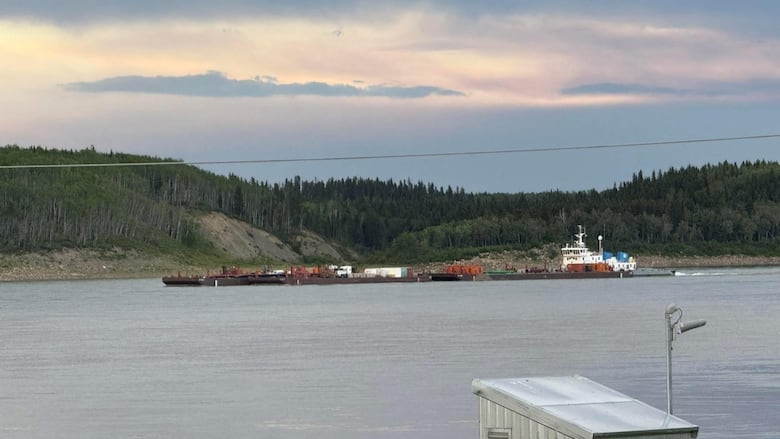Low water, short lead times pose challenges for Sahtu barge season
For some in the region, this year's highly-anticipated barge sailings have been more confusing than expected

The Northwest Territories' barge season has so far been more confusing and frustrating than some residents expected.
Last year, no barges were able to sail into the Sahtu region because of low water levels. This summer, two tows carrying multiple barges each are scheduled to travel down the Mackenzie River, making stops in Tulita and Norman Wells, as well as one in Fort Good Hope.
But short lead times to get cargo on board, and higher prices than expected for certain loads, have made the vessels' eagerly-anticipated departures bittersweet for some Sahtu residents.
People in the region were given just four days to get their cargo on the first tow, which left Hay River on July 6, and less than two weeks to make the second, which is currently set to sail on July 26.
Marine Transportation Services (MTS) states online that the cutoff date for getting goods on the second tow was Wednesday, but MTS director Terry Camsell said Thursday that they're actually still accepting cargo, and will continue accepting it for as long as they can.
"When we planned the first trip, we were unsure when the second trip was going to be, of course. So, I mean, you have to pick a date that you're comfortable with," said Camsell. "If in fact we were able to make the first trip faster, then the second trip, of course, would be sooner."

If and when barges leave depends largely on water levels, and also on wildfires and other factors.
Water levels on the Mackenzie River are still well below average, and it's very difficult to navigate in smoky conditions with little visibility, said Camsell.
He also warned that if water levels drop too low, the second tow might not sail at all. If that happens, MTS plans to truck the cargo to Fort Simpson and ship it out from there on chartered barges.
Begging with suppliers and pulling all-nighters
Knowledge of the cargo acceptance extension came too late for Joshua Earls, the owner of Ramparts, a grocery store in Norman Wells.
"We were told the July 9th cutoff," he said, adding it would have helped to know that he had more lead time "because we rushed to get all our stuff there. It nearly killed me."
Earls normally needs two weeks to organize a shipment of groceries, which made the first tow's tight deadline impossible to meet.
When he learned a second sailing was scheduled with a cutoff date just over a week and a half out, he scrambled – begging with suppliers and pulling two all-nighters.
"I thought it was almost impossible too, but yeah, people helped pull through and make this all happen," he said.

Earls got his two trailers of groceries to Hay River on the morning of the stated cutoff date, but even then, he couldn't let out a sigh of relief. He said he was shocked to learn that MTS would charge him much more for his trailers than what he had paid in the past with another barging service.
"When we got there and got our quote, we realized it was almost the same price as flying in our items, and we thought there was a mistake," he said.
For Earls, shipping cargo down the Mackenzie is the economical way for him to restock his shelves. He believed using the N.W.T. government-operated vessel to get his goods to Norman Wells would help keep his costs down, and similarly the prices in his store.
Now, he said, it seems that isn't going to be the case.
Earls said he would have used Cooper Barging Service, but he wasn't certain the company would run barges this summer. Cooper Barging Service declined to comment.
Camsell said Earls' situation is unique, as trailers are rarely used to transport cargo on the river, and that MTS hopes to "come up with a solution for that customer."
'It wasn't feasible for us'
Only the first tow heading down the Mackenzie River is set to sail all the way to Fort Good Hope.
That set of barges contains fuel for Tulita, Norman Wells and Fort Good Hope, gasoline for the Inuvialuit Settlement Region, and about 400 tons of dry cargo, including goods bound for Sahtu Northern Stores, said Camsell.
But other organizations in Fort Good Hope couldn't get their orders processed in time.
"We couldn't commit to putting things on the ground without certainty that the barge would go, but the decision to get a barge going was so late that it wasn't feasible for us to make an order," said Arthur Tobac, the business manager with Ne'Rahten Development Ltd. in Fort Good Hope.
Tobac would have wanted to ship up building supplies, like paint and insulation. He said using the barge brings down transportation costs.

Chief Collin Pierrot in Fort Good Hope said the band office hauled up a lot of what it needed for community operations on the ice road last winter.
"We didn't know if there was going to be a barge this year again, so we didn't take any chances," he said.
Camsell said there will be a fuel barge that goes from Tuktoyaktuk to Fort Good Hope around July 20, and that people in Fort Good Hope who missed the first tow from Hay River can try to get their cargo on that ship.

